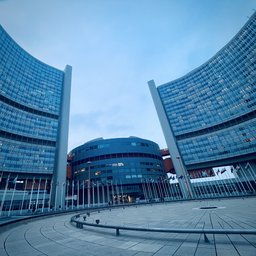One month out from the 2021 Internet Governance Forum, some reflections on the value of the IGF in a rapidly evolving Internet governance environment.
They seem to be perennial questions: “Is it worth attending the IGF?”; “Should we sponsor the IGF?”; and occasionally: “What did the IGF ever do for me?” All stem from the same underlying sentiment - the Internet Governance Forum (IGF) is a major, global event that requires time, money and other resources, all culminating in outputs that can seem ephemeral. So after 15 years of annual events, do we even need the IGF?
Do We Need the IGF?
It’s a multi-faceted question, complicated by diverging ideas of what the IGF could or should be. The notion of the IGF as “just a talk shop” can be problematic - while it’s a riff that's been usefully called into service to motivate a lot of the “evolution of the IGF” work done in recent years, it also opens the question of what role the IGF should have beyond providing a space for conversations. That discussion can get thorny very quickly, so let me sidestep it for now and simply argue that having “just” a dynamic, well-populated IGF that serves as an Internet governance “talk shop” is more necessary and important now than ever before.
How Times Have Changed
When the first WSIS events rolled into an annual IGF in the early years of this century, the field of Internet governance looked very different. Governments and regulators were beginning to grapple with the fact that the Internet had had a profound effect on societies (effects that seemed destined to grow even more profound), on people’s behaviours, and on existing legal and regulatory frameworks. But in most parts of the world, the idea of specific Internet regulation (or other kinds of regulation that accounted for the Internet and its effects) was still relatively embryonic.
Jump to recent years and we find a very different situation - most governments now regard Internet regulation as a significant priority and an important tool to protect their citizens and drive national economic growth and development. Some are working in regional formations (such as the European Union); others are contributing to or adhering to approaches developed in international organisations like the OECD or the ITU. At the same time, global tech corporations, whose current reach and influence were almost unimaginable at the time of the first IGF (which took place just one month after Facebook opened membership to everyone with an email address), are influencing not only legal regulation and government policy, but also technical policy and standards (which themselves have become increasingly politicised). In short, the Internet governance space has gotten complex!
The Risk of Fragmentation
There is plenty of justified hand-wringing about what all this governance activity means for the global Internet. “Fragmentation” has been the concept most widely discussed in threat or risk terms. The threat posed by fragmentation is serious - much of the Internet’s value lies in the fact that it is a global, interoperable network of networks. Disrupt that interoperability and global connectivity, and you diminish the value of the Internet for your citizens (and potentially for other users as well).
The risk of fragmentation can come from many different angles - some proposals appear quite deliberate in their intention to carve out distinct spaces or ecosystems, or to (partially) disconnect from the global Internet. Legislative or regulatory moves like some of those included in the Russian Federation’s “Sovereign Internet” package fall into this category. So too can non-legislative or regulatory proposals, like the “New IP” idea which generated much discussion last year.
Then there are other proposals that unintentionally threaten, directly or indirectly, fragmentation of the global Internet. This includes regulatory efforts that disrupt or disregard the structures and processes that exist to govern the Internet at the global level. The ongoing discussion surrounding the European Union’s proposed NIS 2 Directive (which the RIPE NCC has previously commented on) and whether its scope will cover root name server operators fall into this category. Drawing these elements into national (or in the EU case, supra-national) regulation sets a precedent that other jurisdictions will likely follow, resulting in a patchwork of efforts to govern a global resource.
A Shared Forum
In a way, though, it may be the combination of all of the above that’s most dangerous - a proliferation of divergent, sometimes conflicting governance measures, including regulation, legislation, business approaches, technical standards and community policies. As the web of governance grows more complex, there is a natural tendency towards specialisation, which can lead to a myopic focus on just a small subset of stakeholders. Making policy is no easy task, and with countless policy development processes taking place around the world, participants in those processes simply end up working in their own silos, unaware of how their outcomes could affect the global Internet, other users, or even their own stakeholders.
It’s here that the IGF can play an important role. A venue for building shared understanding, awareness of what other governance activities and initiatives are ongoing, and what lessons have been learned is precisely what is needed. A chance for stakeholders in government and national authorities to meet not only with each other, but with the organisations whose focus is on maintaining the global nature of the Internet. That includes the RIPE NCC and our I* colleagues (the other RIRs, ICANN, and bodies like the IETF and W3C), but also the private sector operators who have built networks and infrastructure - the scale, effectiveness, and value of which are based on the global nature of the Internet.
Has the IGF always lived up to this promise? No. The agenda can feel overstuffed and duplicative (a risk for any event attempting to maximise inclusivity and multistakeholder contribution), and the documentation and reporting necessary to make full use of the wealth of information and insight collected over the years has not reached the standard that it needs to. The IGF’s Multistakeholder Advisory Group (MAG) has recognised and worked to address these challenges in recent years, and there are areas in which there has been clear improvement. More work is needed, however, and that work is ongoing.
Other criticisms of the IGF, however, stray into territory that too often seems to bemoan the lack of a global Internet governance regulator, or the willingness of the IGF to step into such a role. This was never a role for which the IGF was intended, nor is it a role at which it could succeed - indeed, any attempt to take up such a mantle would likely sound its death knell. Most stakeholders recognise this, and few would explicitly endorse such a shift, but the frustration at the apparent inability of the IGF to “do something” remains.
But perhaps we don’t need the IGF to “do something”. Plenty of actors in their various stakeholder configurations are “doing something” in relation to Internet governance, and that’s not a bad thing. The Internet’s criticality to our societies demands it. But, like the natural environment, the Internet that we administer along national, regional, technical, and political axes exists in reality as a global entity. Failure to recognise that is the biggest risk factor towards Internet fragmentation, and the IGF remains our best weapon against that failure.
The Year Ahead
The coming 12 months will see some significant steps in the evolution of the IGF, including the likely creation of a Multistakeholder High-Level Body in its own governance structure, and a new working relationship with the UN Tech Envoy’s office (see here for more information on these developments). As stakeholders in the IGF, we should work to ensure that this evolution steers towards a body even better able to foster the idea so succinctly captured in the theme of this year’s IGF: an Internet united.





Comments 0
The comments section is closed for articles published more than a year ago. If you'd like to inform us of any issues, please contact us.